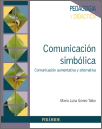Reseña del libro: Comunicación simbólica: Comunicación aumentativa y alternativa Editorial Pirámide, 2020. ISBN papel: 978-84-368-4222-7 - ISBN ePub.: 978-84-368-4223-4
Contenido principal del artículo
DOI:
https://doi.org/10.17979/reipe.2020.7.1.6353Resumen
Este manual presenta un marco teórico, así como pautas para la evaluación y la intervención basados en la literatura más reciente sobre comunicación aumentativa y alternativa (CAA). Está compuesto por siete capítulos en los que destaca el énfasis sobre cómo conseguir la comunicación por encima de herramientas concretas, y se ofrecen técnicas, instrumentos y programas relevantes que están basados en buenas prácticas y que se describen en detalle. El manual resulta de clara utilidad para estudiantes y profesionales que trabajan en este campo, constituyendo una referencia obligada y actualizada en la literatura en español sobre CAA.
Palabras clave:
Descargas
Detalles del artículo
Referencias
McNaughton, D. Y Light, J. (2013). The iPad and mobile technology revolution: Benefits and challenges for individuals who require augmentative and alternative communication. Augmentative and Alternative Communication, 29(2), 107-116. https://doi.org/10.3109/07434618.2013.784930
McNaughton, D. y Light, J. (2015). What we write about when we write about AAC: The past 30 years of research and future directions. Augmentative and Alternative Communication, 31(4), 261-270. https://doi.org/10.3109/07434618.2015.1099736
Sotillo, M. (2003). Sistemas alternativos de comunicación. Madrid: Trotta.
Torres, S. (2001). Sistemas alternativos de comunicación. Manual de comunicación aumentativa y alternativa: sistemas y estrategias. Madrid: Ediciones Aljibe.


